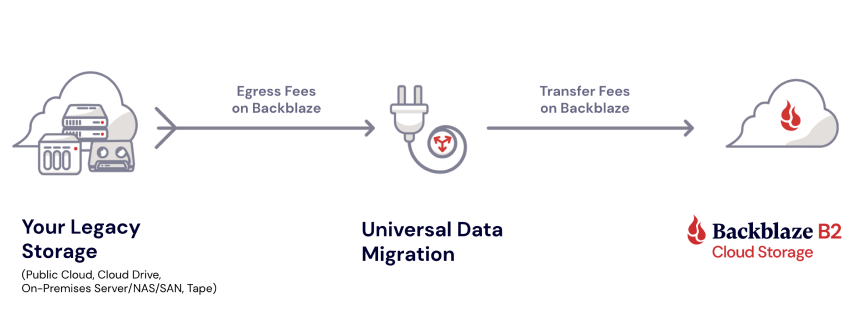Secure Your Information: Finest Practices for Implementing Universal Cloud Storage Space Provider
The comfort of universal cloud storage comes with the duty of protecting sensitive information versus possible cyber dangers. By checking out key strategies such as information security, accessibility control, backups, multi-factor verification, and constant tracking, you can establish a strong defense against unapproved access and information violations.
Information Encryption Measures
To boost the protection of data saved in global cloud storage solutions, robust information encryption measures ought to be implemented. Information encryption is a crucial part in protecting sensitive info from unauthorized gain access to or breaches. By transforming data into a coded layout that can only be analyzed with the correct decryption trick, file encryption makes certain that even if information is obstructed, it stays muddled and secured.
Implementing strong file encryption formulas, such as Advanced Security Standard (AES) with an adequate crucial size, includes a layer of protection against possible cyber dangers. In addition, utilizing secure essential monitoring techniques, consisting of normal vital turning and protected crucial storage space, is vital to maintaining the integrity of the encryption procedure.
Moreover, organizations ought to think about end-to-end file encryption services that secure information both en route and at remainder within the cloud storage setting. This comprehensive strategy aids minimize threats connected with data exposure during transmission or while being stored on servers. On the whole, focusing on information file encryption measures is extremely important in fortifying the security stance of global cloud storage services.
Gain Access To Control Policies

Gain access to control plans ought to be based upon the principle of the very least privilege, approving users the minimal level of accessibility required to execute their job works effectively. This aids minimize the danger of unapproved access and prospective information violations. Additionally, multifactor verification needs to be employed to add an extra layer of security, needing customers to offer several kinds of verification prior to accessing sensitive information.

Normal Information Back-ups
Applying a robust system for normal information backups is important for guaranteeing the resilience and recoverability of data stored in global cloud storage space services. Regular backups work as an important safeguard against information loss as a result of unintended removal, corruption, cyber-attacks, or system failures. By establishing a routine backup routine, organizations can minimize the risk of devastating data loss and preserve service continuity when faced with unanticipated events.
To effectively implement routine data backups, organizations need to comply with best techniques such as automating back-up procedures to ensure uniformity and dependability - linkdaddy universal cloud storage press release. It is very important to validate the integrity of back-ups periodically to guarantee that information can be successfully recovered when required. Additionally, saving backups in geographically visit the website diverse areas or utilizing cloud replication solutions can additionally boost information resilience and reduce threats associated with local incidents
Inevitably, a positive technique to regular information back-ups not only safeguards versus data loss however likewise instills self-confidence in the stability and accessibility of crucial details stored in universal cloud storage space services.
Multi-Factor Authentication
Enhancing protection steps in cloud storage space services, multi-factor verification provides an extra layer of protection against unapproved gain access to. This technique requires customers to supply two or more types of confirmation before acquiring entrance, dramatically minimizing the threat of data breaches. By integrating something the customer knows (like a password), with something they have (such as a smart phone for obtaining a verification code), or something they are (like biometric data), multi-factor authentication improves security beyond simply making use of passwords.
Executing multi-factor verification in YOURURL.com global cloud storage space solutions is important in protecting sensitive info from cyber dangers. Also if a cyberpunk takes care of to acquire an individual's password, they would still need the extra confirmation aspects to access the account effectively. This dramatically lowers the likelihood of unauthorized access and strengthens overall data protection measures. As cyber threats continue to evolve, incorporating multi-factor verification is a vital technique for organizations seeking to secure their information properly in the cloud.
Constant Safety And Security Tracking
In the realm of protecting delicate info in universal cloud storage space services, a critical part that matches multi-factor authentication is continual safety monitoring. Constant safety and security surveillance includes the ongoing security and analysis of a system's protection steps to discover and respond to any kind of prospective hazards or vulnerabilities quickly. By implementing constant security tracking protocols, organizations can proactively recognize dubious tasks, unapproved gain access to efforts, or unusual patterns that might indicate a safety and security breach. This real-time tracking makes it possible for quick activity to be taken to alleviate dangers and safeguard useful data saved in the cloud. Automated alerts and notices can signal security teams to any kind of abnormalities, enabling instant examination and removal. Moreover, constant protection monitoring helps make certain conformity with governing requirements by supplying a thorough document of security events and steps taken. By incorporating this technique right into their cloud storage strategies, companies can enhance their general safety and security position and strengthen their defenses against evolving cyber hazards.
Conclusion
